MTG Commander Politics - A Guide To Diplomacy At The Table

In Magic: The Gathering, few formats require the balance of strategy and social finesse, like Commander. The dynamics of interacting with multiple opponents force players to become diplomats as much as strategists. And doing it well is a subtle art that can be the difference between winning and losing. So, today, we dive deep into commander politics and how to do them correctly.
If you want to improve at politics in commander, you're in the right place. I'll cover how to open lines of communication, forge alliances that advance your game plan (and your allies, too), time your moves correctly, and adjust to the ever-changing landscape of EDH. So, without further ado, let's jump into the art of table diplomacy.
How To Get Better At Commander Politics
Commander is a multiplayer, and the other players don't always have to be your enemies. In fact, teaming up, making deals, and handling big problems together is part of what makes the format so fun. However, it can also be challenging because, in my experience, there are often no clear-cut "right & wrong" choices.
And doing poorly at table talk can do a lot of damage to an otherwise winning game plan. That said, a well-forged alliance can greatly impact how well you do (and how much fun you have) in a game of EDH. So, here are some tips, tricks, and advice to help you with commander politics.
Be Social And Open Lines Of Communication
This feels like it goes without saying, but it doesn't. I've seen plenty of players sit down at the table and just, not talk. Some people are quieter and less outgoing than others, and many have social anxiety or may be shy - There is nothing wrong with that. But if you're going to make friends and teammates throughout the game, you'll need to initiate conversation, and the earlier, the better.
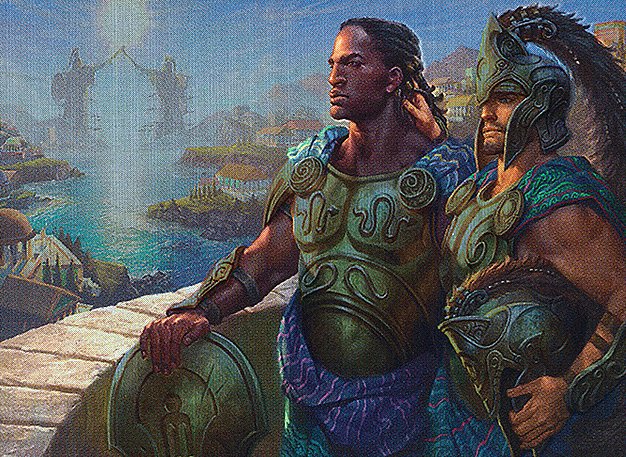
If you have trouble with this, worry not. Take comfort that even if you're new to the game or playing with strangers, you know that you've got at least one thing (and probably many more) in common - Magic: The Gathering and Commander. And this is always a great jumping-off point for conversation. Beyond that, being generally friendly goes a long way. Simple greetings, handshakes, and small talk about cards or whatever else comes up help set the stage early and make it easier to negotiate and collaborate later.
Here are a few more tips for the early game (some of which I'll expand on later) that help build trust and camaraderie early in the game. First, don't "poke the bear." Sometimes, we get into the habit of doing things just because we can, and we want to use all our mana each turn, cast our cards, and, in general, play magic.
You May Also Like: Wilds of Eldraine Commander Precons Decklist Complete
But sometimes, you should stop and think first, at least. Just because you have a Disenchant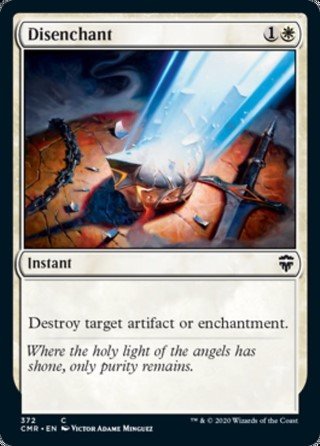 doesn't mean you have to cast it on whatever enchantment the player to your left cast, just because you don't have another play. If it doesn't help you, it is best not to ruffle feathers and save your cards. This comes up a lot when you want to attack on your second turn, and there is only a single player you can get through on. Do you attack just because you can?
doesn't mean you have to cast it on whatever enchantment the player to your left cast, just because you don't have another play. If it doesn't help you, it is best not to ruffle feathers and save your cards. This comes up a lot when you want to attack on your second turn, and there is only a single player you can get through on. Do you attack just because you can?
Maybe. It's okay to, but if you do, try saying, "Sorry. You're the only person I can hit." It seems simple, but it goes a long way in letting others know you aren't making an enemy of them. Believe it or not, this "just business" approach works. And call me a softy if you must, but if the open player isn't who I'm going to latch onto and do my best to take out first, I often don't attack just because I can in the first few turns. I like blockers, and it helps to make friends.
Offer Mutually Beneficial Agreements
At the end of the day, each player will (at least in most cases) be trying to win the game. So, deals and alliances will have to benefit everyone involved if you're to convince someone to work with you. And keep that in mind when someone pitches you a deal - Does this help you at all? Is it worth it to use your resources? Giving something and getting nothing isn't an alliance. However, dealing with something for someone else for a favor you can cash in later isn't always a bad deal - Especially if what you're doing also benefits you.
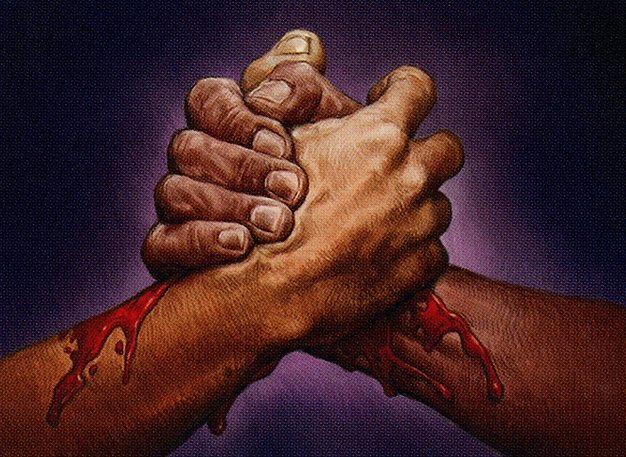
For example, let's say someone is playing Urza, Chief Artificer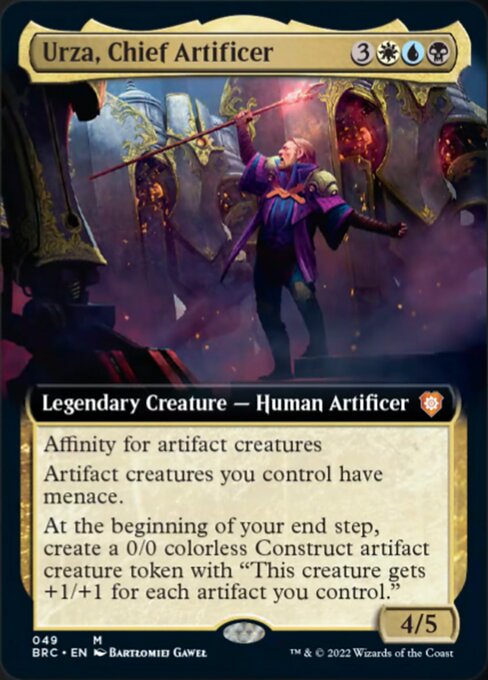 as their commander and being shut out by an opposing Kataki, War's Wage
as their commander and being shut out by an opposing Kataki, War's Wage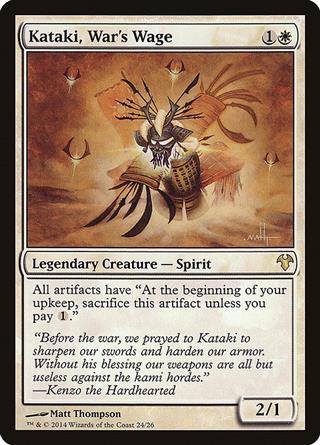 . Now, let's say you have a Smothering Tithe
. Now, let's say you have a Smothering Tithe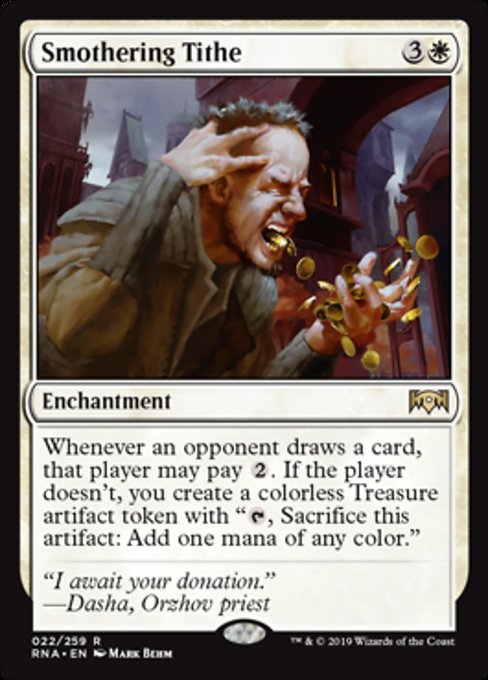 or Dockside Extortionist
or Dockside Extortionist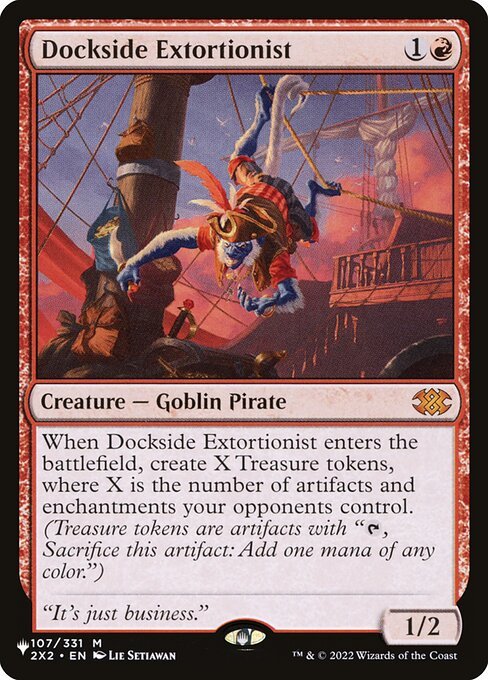 that you want to cast in the coming turns, and you have a removal spell. When the Urza player speaks up and complains about Kataki, it's okay to be the knight in shining armor because removing it clears the board for your plans and secures you a future ally.
that you want to cast in the coming turns, and you have a removal spell. When the Urza player speaks up and complains about Kataki, it's okay to be the knight in shining armor because removing it clears the board for your plans and secures you a future ally.
In this case, an "if I remove that for you, can I count on you for a favor later?" is an acceptable trade. If you didn't have cards in hand that would be better without Kataki on board; using your cards to remove something only hurting an opponent isn't something you want to do out of the goodness of your heart. All deals should benefit all players involved.
Making Friends Also Means Making Enemies
I preach that players will never let you destroy their things and do nothing. I don't mean they'll be spiteful, but they'll also not take a turn-the-other-cheek philosophy. If you destroy something of someone's, they'll likely retaliate in some way, shape, or form. So, keep that in mind, and don't poke the bear when you don't need to. And take the same approach for your permanents - If someone is going to destroy your stuff, they need to know there will be consequences.
Don't fall into the trap of being the only player dealing with threats because you'll also be the only one using cards and drawing the stronger player's wrath. Instead, you usually want to be deal-making, where your allies also use cards and make enemies. Similarly, you typically want to focus primarily on a single player to take out first anyway, and having whoever your target is the common enemy of you and the other players is where you want to be.
You May Also Like: Top 10 Saltiest Commander Cards
Here is a pro tip that I have found works great. Simply openly asking questions like, "What's the biggest threat on the board right now?" or "Is there anything we need to be worried about right now?" is amazing on multiple levels. First, you ask this, and other players point out a certain card; you've made them accomplices. If/when you remove it, you'll pull the trigger, but they'll be the ones who aimed it! And I promise the receiving player won't forget.
If you really want to be sly, try adding a "Sorry, they're right... This has to go." as you remove it to point the finger further away from yourself. Not only does this shift blame from you to them, but it also makes it seem like you've helped out the players who spoke up or "even done their bidding." When in reality, you've had them be the bad guy for identifying the obvious choice on the board.
There is one important caveat here, though - What's bad for another player may not be bad for you. In those cases, you should consider saving your cards. I've seen it time and again where one player repeatably says how their playgroup has terrible threat assessment, when in reality, what they see as a "threat" doesn't bother other players at all. Don't be the bad guy in those cases unless someone has something to offer you.
Secondly, questions like the ones above also help you pick up on things you may have missed and go a long way in making you a better player.
Deal Timing Is Important
What do I mean by deal timing? Well, as mentioned, you'll want to start at least conversing early on. Then, from there, choose your moments to engage in diplomacy wisely. For example, if you only start trying to forge alliances when you're in a vulnerable position or down and out, you might come off as insincere, desperate, or have nothing to offer potential allies. This isn't where you want to be.
On the other hand, approaching players when you have a strong position can help you offer mutually beneficial deals. It can go a long way in taking players out of the game. If you're in a good spot, you'll usually have leverage and can use players in more challenging spots to do what you can't.
For example, say you have a formidable board, but the person you're trying to take out has multiple Ghostly Prison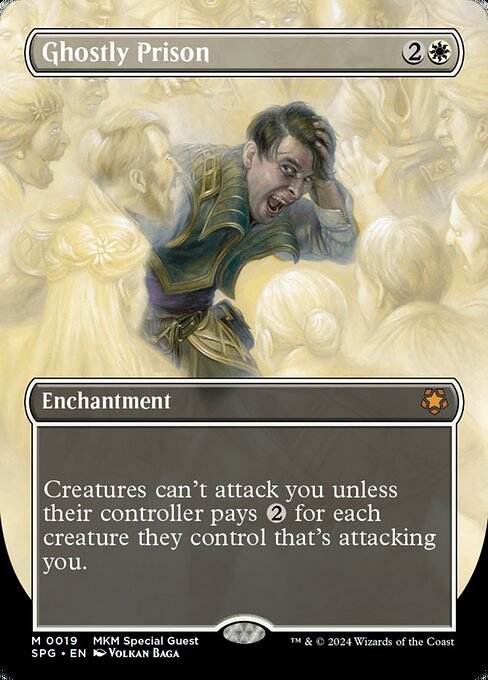 effects in play, and you can't swing at them. In these cases, I would recruit another player and offer them immunity (for a while) from your future attacks if they can clear the pillow fort from your desired target. This is another great example of making someone else the bad guy and sharing the blame. You hit them for a ton of damage, yes. But that other guy removed their protection.
effects in play, and you can't swing at them. In these cases, I would recruit another player and offer them immunity (for a while) from your future attacks if they can clear the pillow fort from your desired target. This is another great example of making someone else the bad guy and sharing the blame. You hit them for a ton of damage, yes. But that other guy removed their protection.
Conversely, don't be afraid to distance yourself from someone on a sinking ship. If one player is nearly done, they'll often seek allies or help. Sometimes, you'll need to pass on deals, and that's okay. Remember, aligning with one player may put a target on your back. So, don't side with the player at two life against the person at 60 out of the goodness of your heart.
Because they likely won't be around long enough to make the deal worth it. There are exceptions to this advice; just be sure to make sure you have a reason to do so and a plan. That said, be respectful when declining deals. In my experience, honesty is the best way to do this. "Sorry, I would help if I could." or "We should have teamed up earlier." are good options.
Adapt To The Changing Landscape
This one goes hand in hand with timing. Commander games are fluid, with board states, momentum swings, and alliances evolving rapidly. Be prepared to adjust your partnerships as the game progresses because others will do the same. You probably won't have the ally the entire game, and if you do, you'll still have to face off with them in the end.
My most significant advice here is to define specific terms for your deals and alliances. "If I do this, can you do that?" is much better than "Let's work together" because that's so open-ended and marries you to that player.
Loyalties can shift based on who poses the most significant threat or who has the resources you need. Later, if you need to shift alliances or take action against your initial ally, you'll want to be able to do so without breaking your word, and "Let's watch each others back." is too vague and can leave them feeling betrayed. Instead, you want deals with specifics that, once fulfilled, allow you to move around as needed. For example, "If I counter that for you, will you use your commander's ability for me?"
Simple, straightforward terms let everyone involved know what's expected of them to make good on a deal. And help a lot to mitigate future deals that you may make with other players. This also leads directly to my final piece of advice on commander politics.
Keep Your Promises!
Trust is the cornerstone of diplomacy. If you make an agreement, stick to it! Breaking your word can tarnish your reputation and make securing alliances challenging. Plus, if you rip someone off, they'll do whatever they can to get you out of the game, so the double cross better have been a game-winning play. As mentioned, it is essential to make straightforward deals where your partner knows precisely what they're expected to do and what they'll get in return.
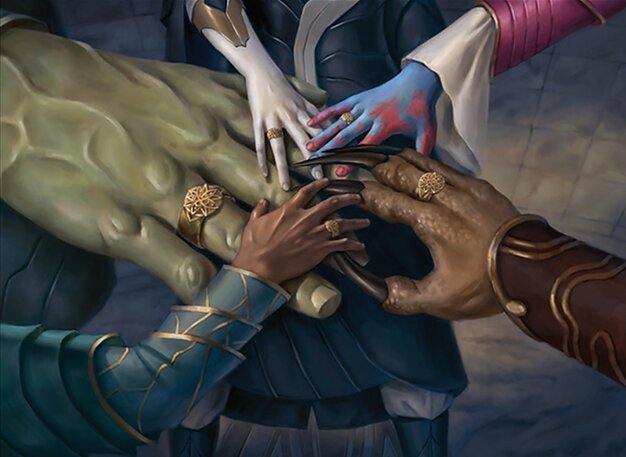
Vague deals like "I'll help you" can leave a player feeling like you broke your word when, in reality, you have different ideas of what that meant. Keeping your word is probably the most important factor in commander politics, so keep that in mind. Another thing that helps define expectations and make your word golden is to be sure not to promise something you're not confident you can do. At the same time, players aren't likely to give you something for a "maybe."
In situations like this, be sure to make it known you'll do what you can, but only to a preset extent. I recently had a player let me hit them with 11 tokens to draw cards with Bident of Thassa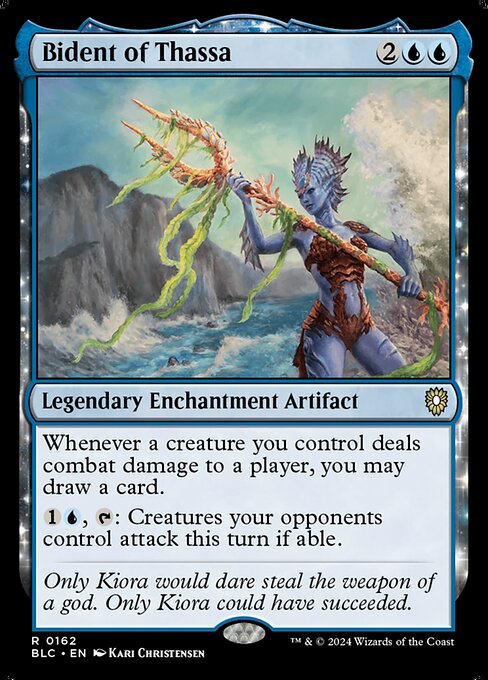 in search of an answer to the Fraying Sanity
in search of an answer to the Fraying Sanity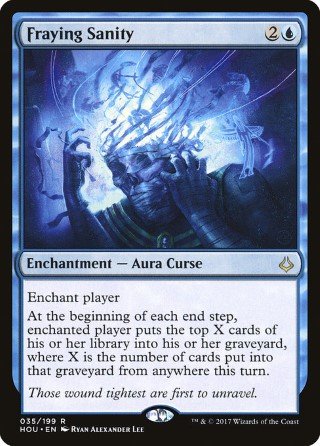 they were cursed with. I got to draw cards, and they got a possible out to losing to Mill. I was sure to be clear it was possible I didn't draw and answer, so there were no hard feelings if I couldn't save them.
they were cursed with. I got to draw cards, and they got a possible out to losing to Mill. I was sure to be clear it was possible I didn't draw and answer, so there were no hard feelings if I couldn't save them.
Maintain a Positive Attitude
You can't win em all, and how you behave when you lose can greatly impact if people choose to work with you in the future. Don't finger-point and obsess over the what-ifs with things like, "If you'd have listened to me, we wouldn't have lost." or "You only won because yall ganged up on me!"
Even if things don't go your way, approach the game positively. A gracious loser who contributed to a fun game is a good candidate for future alliances. And the same is true if you win... Be a gracious winner; you'll be someone people want to align with, win or lose, and have fun.
Conclusion
Diplomacy is an integral part of Commander. By understanding more of the social dynamics at play and making strategic decisions that benefit you and your allies, you can elevate your MTG politics to new heights. So, the next time you sit down at the Commander table, remember these tips and tricks, and you'll be more likely to forge game-winning relationships.




